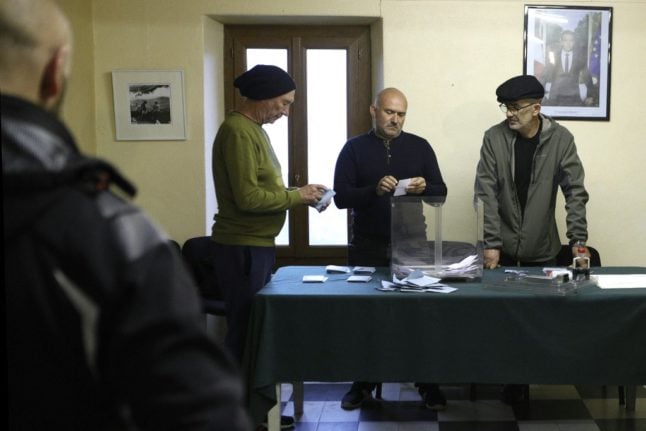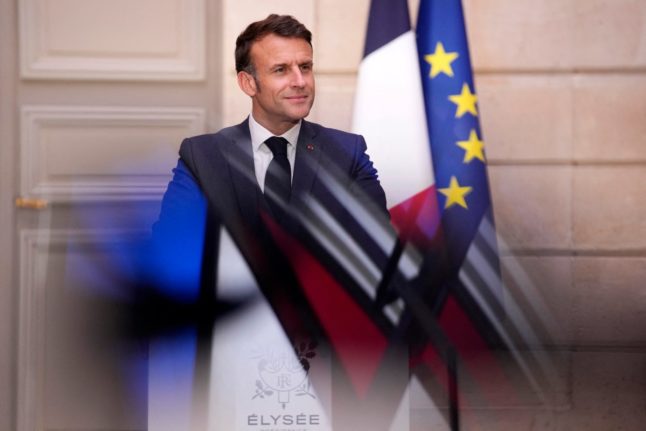Emmanuel Macron beat Marine Le Pen in the second round of the French Presidential election with 58.55 percent of the vote, a smaller share than his 2017 victory where he secured 66.1 percent of the vote. Though Macron won, the election highlighted growing ideological differences in France. Recognising these fractures, Macron promised that he is “no longer the candidate of a camp, but the president of all.”
To see the vote breakdown by département, VisActu created a map, based on a département level breakdown showing the areas that voted for Le Pen (in blue) and Macron (yellow). Inset is the first-round voting map, which adds areas won by the far-left candidate Jean-Luc Mélenchon in red.
🇫🇷 Présidentielle. Le vote au second tour.
Les résultats dans les départements (selon les résultats publiés par le ministère de l'Intérieur à 01h00 / 99% des résultats parvenus).
Emmanuel Macron réélu avec 58,34% des voix. pic.twitter.com/MXNkG1UzpJ— Visactu (@visactu) April 24, 2022
The Interior Ministry has created an interactive version of the map where you can search for the vote in your local area – click HERE to access it.
Over the last five years there has also been a geographical shift in voting, with the below map from Franceinfo showing the decline in support for Macron in Brittany.
Bretagne, Creuse, outre-mer…
Visualisez comment Emmanuel Macron a perdu du terrain face à Marine Le Pen en une image
👉https://t.co/jMWEDXTeku pic.twitter.com/mLYfRNQhl0
— franceinfo plus (@franceinfoplus) April 25, 2022
This election also showed another geographical trend: the east-west divide, which was also apparent in 2017. This is particularly visible in a map produced by Le Parisien:
DIRECT 2022 | Notre décryptage sur cette carte de France du vote Macron et Le Pen, deux France que tout sépare.
➡️ https://t.co/W2NuNnXtrD pic.twitter.com/TjZf7eV253— Le Parisien (@le_Parisien) April 25, 2022
Les deux France en une carte. pic.twitter.com/1cG6xQckfC
— MarionVan Renterghem (@MarionVanR) April 25, 2022
The divide between the east and west is really a combination of different factors, including the ‘rust belt’ in the north-east of the country, which voted primarily Le Pen in both the first and second rounds of the election. Home to the country’s former industrial and coal-mining areas, it has in recent years seen high levels of unemployment.
READ ALSO: MAP: How geography affects how French people vote
But it’s not just geography that influences how people vote – age is another big factor.
French daily Le Parisien created this graphic to show generational divides. The youngest and the oldest voter groups (ages 18-24 and over-70s, respectively) strongly prefer Emmanuel Macron, whereas those aged 50-59 narrowly prefer Le Pen.
DIRECT RÉSULTATS | Âge, revenus, profession… découvrez le profil des électeurs d’Emmanuel Macron et Marine Le Pen #2ndTour #Presidentielle2022
➡️ https://t.co/A6fKfQfPnI pic.twitter.com/I7DbtoIJu7— Le Parisien (@le_Parisien) April 24, 2022
In the same graphic, Le Parisien also showed how income and education level was reflected in voting patterns, with Marine Le Pen attracting more working class voters than Emmanuel Macron.
France also saw the highest level of abstention in 50 years, with over 28 percent of people abstaining from voting.
🔴 ALERTE INFO
L’abstention au second tour avoisinera 28%, soit 2,6 points de plus qu’au second tour en 2017 (25,4%), selon notre estimation Ipsos-Sopra Steria#Presidentielle2022 pic.twitter.com/GHrJJG1iX6
— franceinfo plus (@franceinfoplus) April 24, 2022
To hear more about the results of the election and the issues that mattered most to voters, listen to The Local’s Talking France podcast, which concluded its election coverage last night.



 Please whitelist us to continue reading.
Please whitelist us to continue reading.
Thanks for the breakdown of how the French voted. After just arriving in Europe, and planning on spending several months in France, we will avoid Le Pen supported areas like the plague. We prefer to spend our money supporting people who aren’t insane. Unfortunately, that means no longer consuming my preferred Bordeaux wines.